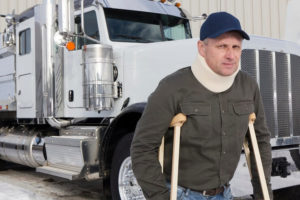The Dangers of Improper Semi-Truck Maintenance

When a heavily-loaded commercial truck collides with a smaller vehicle, serious or fatal injuries are almost inevitable. After a truck accident, you may be quick to pin the blame on driver error, but a large number of big-rig accidents are the direct result of a failure to inspect and maintain the truck as required by law. There are some major differences between an automobile accident and a semi-truck accident, which we will address below.
First, it’s worth mentioning that if you are involved in a truck accident, you will need to retain an experienced trucking accident attorney, no matter the circumstances. Look no further than Van Law Firm–our award-winning staff will help get to the bottom of your accident and recover the compensation that you deserve. Call our office nearest you to learn more.
Lack of Truck Maintenance Causes Accidents
Timely maintenance is mandated by the Federal Motor Carrier Safety Administration (FMCSA). Failure to inspect, repair, or maintain a semi-truck can leave an innocent person with permanent or even fatal injuries.
For a free legal consultation, call (725) 900-9000
If required maintenance is not performed, a myriad of safety risks start to arise: issues with the brakes can cause trucks to have trouble stopping; old or damaged tires can cause a tire to blowout, leading to the driver losing control; poorly maintained brake lights can result in other drivers being unaware that the truck is braking, and so on. Drivers, trucking companies, and mechanics may all be liable if a poorly maintained truck causes an accident.
You may have a personal injury case if you have been in a truck accident where any of the following contributed to the collision:
Rear-end collision – The big rig is unable to stop due to faulty or poorly maintained brakes and impacts another vehicle.
Rollover – The big rig is unable to stop, so the driver makes a sudden steering move to avoid a collision. The truck flips over, potentially spilling dangerous cargo.
Jackknife – The brakes lock up or the driver fails to stop, and the trailer swings out to the side, creating a 90-degree angle with the cab. This causes the truck to collide with all vehicles in its path.
T-bone – Failure to stop causes the truck to impact the side of a vehicle.
Size Differences: Cars v. Trucks
A fully-loaded semi-truck is about 22 times bigger than the average automobile. The weight of a tractor-trailer ranges from 35,000 pounds empty to 80,000 pounds at full capacity. Standard size semi-trailers are about 53 feet long. When you add the cab’s length, the entire semi-truck is between 70 and 80 feet long. Most passenger vehicles are between 14 and 18 feet long. Even the largest SUVs are under 19 feet long.
Click to contact our personal injury lawyers today
A car’s driver can swerve from obstacles whereas a truck cannot. Tractor-trailers need up to 40 percent more space to stop than passenger vehicles. It typically takes the length of two football fields for a big rig to come to a complete stop after the brakes are applied. The distance can be even greater on wet or slippery roads or if the truck brakes are poorly maintained. That is why tractor-trailers are so dangerous when they come upon a stopped or stalled vehicle.
Overloaded Trucks and Overworked Drivers
Complete a Free Case Evaluation form now
Overloaded and incorrectly loaded semi-trucks can cause fatalities. Far too often, trucks are carrying too much cargo or carrying it incorrectly. There are regulations in place to prevent this type of accident, but unfortunately, they are not always followed. If a truck driver is negligent incorrectly securing his/her load, the results can be catastrophic. When cargo loads shift, the vehicle’s center of gravity changes and can cause the driver to lose control. A driver should check the cargo after driving the first 50 miles to make sure nothing came loose. After that, the freight should be checked every 150 miles. Every company and any person that interacts with the truck’s cargo who is deemed irresponsible and careless upon loading the cargo will be held liable.
In addition, truck drivers work incredibly long hours, and although federal laws regulate how many hours someone can drive, those rules are often ignored. 1 in 4 truck drivers have admitted to falling asleep while driving, and fatigue is a major factor in truck accidents. Truck drivers can face other problems such as mechanical failure, objects on the highway, and poor road conditions, and if they are not totally alert it can spell disaster for those nearby.
Tips For Avoiding Potential Accidents
There are plenty of steps you can take to avoid truck crashes. Maintaining a solid distance behind, in front, and on both sides of trucks is crucial. If road conditions are poor, give trucks as much space as possible. Remember you are less than 5% of their size. The majority of people who die in a car accident are passengers. Many of these collisions could be avoided by following road safety rules.
The Benefits of Hiring a Trusted Attorney–Contact VLF Today
Dealing with laws, insurance agents, and large trucking companies can be overwhelming. A lawyer can help. Having an attorney on your side means that you have peace of mind. The sooner you call a lawyer, the stronger your case will be. A good lawyer knows what evidence to collect and use and how to prove your case effectively.
The benefit of hiring Van Law Firm is that we can fully evaluate your case, examine all of the claim elements, and make sure that you obtain maximum value from the truck’s insurance carrier. When you have big trucks and injured people, you want a lawyer that’s going to communicate with you and effectively evaluate your case.
If you have been injured in a truck accident due to the negligence of another party, you may be able to sue for damages. As mentioned, you may be able to sue the trucking company, the individual driver, or both. Knowing a few basics about accident liability can help you decide whether you need to sue. Call our office nearest you now to get started with a free consultation.
No obligation consultations are always free.
Let Us Help You! Call Now: (725) 900-9000


